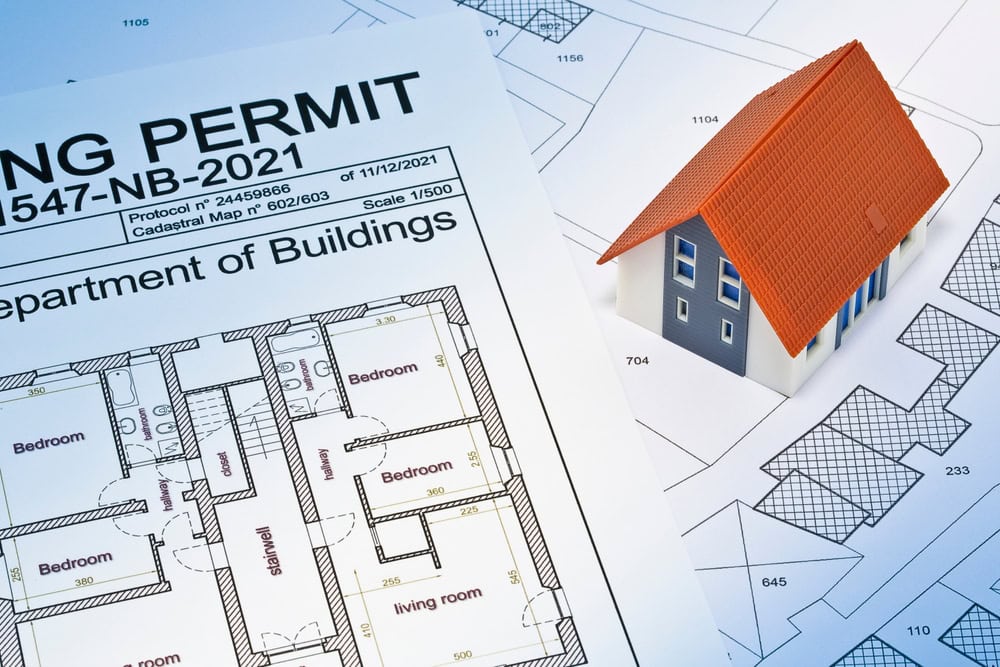When plans for construction and renovation projects are put into motion, someone will have to pull a permit. Building permits are crucial as they ensure safety and compliance with zoning requirements.
Anytime you’re wondering, “Do I need a building permit for my project?” you can check out the Contractors State License Board (CSLB) to get your answer – but whose job is it to pull it?
Figuring out whether the property owner or the contractor is responsible for obtaining a building permit can be a source of confusion for homeowners and contractors alike. This article should help you if you’re ever in a situation where you’re not sure which party is responsible for handling this piece of the project’s paper trail.
Before we dig too deep into legal precedents and California state regulations for building permits, it’s worth it to check out a few of our recent articles on building permits – The 10 Most Common Permits for Construction Work in California and Does A Contractor Have To Pull Permits?
Building Permits in California
Building permits are exactly what they sound like legal documents that permit you to build. These agreements are often highly localized and will be specific to your city, county, or even local HOA.
In short, a building permit is an official document that says, “Hey, a local governing body requires permission before this type of construction, remodeling, or renovation work is performed. And check it out, permission has been granted.”
Building permits are highly flexible and can be an extremely complex patchwork of rules and regulations, many of which were created decades ago. Building permits dictate things like maximum building heights, acceptable materials, and even more specific stuff like what type of roof you can have.
California Building Permit Legal Frameworks
Building permits are regulated at both state and local levels in California.
The California Building Standards Code (Title 24) indicates how construction projects ought to be run throughout the state – then city and county officials can add their own specific requirements for worksites in their areas.
How do you know about your local area’s building permits? Well, you do the legwork to find out. Contact your local building department or zoning board – they’ll be more than happy to tell you all the stuff you can’t do!
When Does a Homeowner Need to Pull a Permit?
Here are a few common scenarios where a California homeowner would be most likely responsible for getting the building permit:
Structural Changes
If the property owner wants to make structural changes like…
- Adding or removing load-bearing walls
- Changing the foundation
- Altering the roof structure
Electrical Work
If the property owner wants to…
- Install new electrical circuits
- Upgrade the main electrical service panel
- Add outdoor lighting fixtures
Plumbing and Mechanical Systems
When it’s time for the property owners to…
- Install or replace water heaters
- Alter or extend plumbing lines
- Install HVAC systems
Major Renovations
Also, of course, when it’s time for major renovations like…
- Kitchen or bathroom remodels
- Room additions or extensions
- Significant interior or exterior renovations
Truthfully, it is most optimal for California homeowners when the contractor oversees the permitting process because it lessens the liability for the property owner.
In What Case Does a Contractor Need to Pull a Permit?
When contractors are brought in to perform work on behalf of a homeowner or property owner, they’re typically responsible for obtaining permits in these scenarios:
New Construction
- Building a new home or structure
- Constructing additions for existing buildings
Commercial Projects
- Renovating or constructing commercial properties
- Developing commercial spaces
Specialized Trades
- Contractors with specialized licenses pull permits for their respective trades like…
- Plumbers
- Electricians
- HVAC contractors
Complex Projects
Construction projects involving multiple phases and requiring coordination between various contractors may call for a general contractor to oversee the permitting process.
Summary
For contractors, being well-versed in local regulations and building codes comes with the territory, so they should expect to handle permit applications most of the time. However, homeowners should make it their business to communicate clearly with their contractors about permits.
Homeowners should also feel empowered to check with their local building department, zoning department, or city hall to determine which specific permit requirements affect their construction project. Failure to secure all necessary permits can result in costly fines, delays, or even the removal of non-compliant construction work.
It’s important to remember that any building project is a collaboration. Whether you’re a property owner or a contractor, you’re working toward the same result.
You want to ensure that a structure is safe and compliant so regardless of whomever is handling the permitting process, you still want to help out and make sure everything is all squared away.

